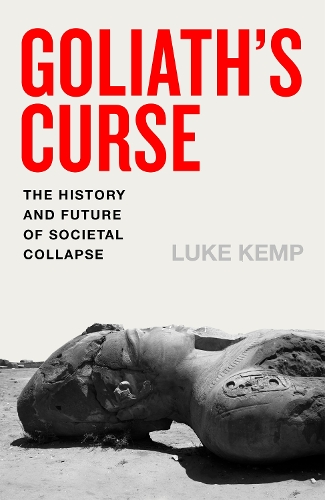
Goliaths Curse: The History and Future of Societal Collapse
(Hardback)
Available Formats
Publishing Details
Goliaths Curse: The History and Future of Societal Collapse
By (Author) Luke Kemp
Penguin Books Ltd
Viking
3rd August 2025
31st July 2025
United Kingdom
Classifications
General
Non Fiction
Social and cultural history
Sociology and anthropology
Social forecasting, future studies
Impact of science and technology on society
The environment
909
Physical Properties
Hardback
592
Width 162mm, Height 242mm, Spine 50mm
842g
Description
A radical retelling of human history through collapse, and what it means for our uncertain future A radical retelling of human history through collapse - from the dawn of our species to the urgent existential threats of the twentieth-first century and beyond - based on the latest research and a database of more than 440 societal lifespans over the last 5,000 years. Why do civilisations collapse Is human progress possible Are we approaching our endgame For the first 200,000 years of human history, hunter-gathering Homo sapiens lived in fluid, egalitarian civilizations that thwarted any individual or group from ruling permanently. Then, around 12,000 years ago, that began to change. Slowly, reluctantly we congregated in the first farms and cities, and people began to rely on lootable resources like grain and fish for their daily sustenance. When more powerful weapons became available, small groups began to seize control of these valuable commodities. This inequality in resources soon tipped over into inequality in power, and we started to adopt more primal, hierarchical forms of organisation. Power was concentrated in masters, kings, pharaohs and emperors (and ideologies were born to justify their rule). Goliath-like states and empires - with vast bureaucracies and militaries - carved up and dominated the globe. What brought them down From Rome and the Aztec empire and the early cities of Cahokia and Teotihuacan, it was increasing inequality and concentrations of power which hollowed these Goliaths out before an external shock brought them crashing down. These collapses were written up as apocalyptic, but in truth they were usually a blessing for most of the population. Now we live in a single global Goliath. Growth-obsessed, extractive institutions like the fossil fuel industry, big tech, and military-industrial complexes rule our world and produce new ways of annihilating our species, from climate change to nuclear war. Our systems are now so fast, complex and interconnected that a future collapse will likely be global, swift and irreversible. All of us now faces a choice- we must learn to democratically control Goliath, or the next collapse may be our last. 'Brilliant and insightful . . . guaranteed to keep you thinking during the day and wide awake with worry during the night' Eric Cline 'This is the book on societal collapse that I had always hoped someone would write' Walter Scheidel
Reviews
Renowned existential risk specialist Luke Kemp looks both back into history and forward into the future, spelling out the dangers that we currently face and suggesting ways in which we might avoid the pitfalls leading to collapse, before our luck runs out. This is a brilliant and insightful book, guaranteed to keep you thinking during the day and wide awake with worry during the night -- Eric Cline, author of 1177 B.C.: The Year Civilization Collapsed
This is the book on societal collapse that I had always hoped someone would write. It was worth the wait! -- Walter Scheidel, author of The Great Leveler
A profound and mind-expanding book that challenges the existing narratives of societal collapse. Through a long-term lens, Kemp asks us to reconsider histories we thought we knew, a present we take for granted, and future perils we have yet to meet. This is a chillingly enlightening read, which will reorient your understanding of the world and how it came to be -- Richard Fisher, author of The Long View
Author Bio
Luke Kemp is a research associate at the Centre for the Study of Existential Risk at the University of Cambridge. He has a background in human geography, international relations and economics, all of which he tutored or lectured in at the Australian National University (ANU). His research has been covered by media outlets such as the New York Times, the BBC and the New Yorker.
